PRIZES & SPONSORSHIPS
Voiceless continues to support the growth of the animal protection movement by sponsoring the below prizes and conferences.
Current Prizes and Sponsorships Past Prizes - Eureka Past Prizes - Media Past Prizes - Writing Conferences
CURRENT PRIZES AND SPONSORSHIPS
VOICELESS ANIMAL LAW PRIZE 2024
We are delighted to award the Voiceless Brian Sherman 2024 Animal Law Prize to Shatha Hamade!
Shatha perfectly reflects the spirit of the prize with her passion, dedication, and out-of-the-box thinking. She has spent years working to protect animals from cruelty, focusing on law reform and investigations, which often lead to strategic campaigns. Her investigations, for example, have been hugely impactful in uncovering cruelty to animals in the live export trade and ultimately achieving the live export ban. Recently, her work has spotlighted the suffering of pigs in slaughterhouses. Along with her brilliant legal and campaigning skills, Shatha has demonstrated tenacity and courage in her fight to improve the lives of animals, with her work often coming at a personal risk and cost.
Shatha is a true animal rights champion, and we are proud to have her as our Brian Sherman Animal Law Prize recipient. We sincerely thank Dr Meg Good and Dr Sophie Riley for conceiving of and supporting the prize.
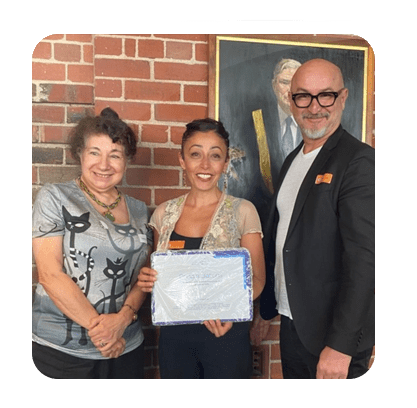
From left to right: Dr Sophie Riley, Shatha Hamade and Professor Nick James.
ANIMAL JUSTICE AWARDS – 2024
Voiceless was honoured to join the Animal Justice Foundation at the 2024 Animal Justice Awards to support the work of those committed to and effective within the animal justice field. Our Voiceless Award for Youth Advocacy was awarded to Jenna Smith from Jenna’s Page, who had demonstrated passion, commitment, and transformative work for NSW animal rescue shelters and organisations over the past few years.
Our Voiceless Award for Animal Protection Education was awarded to Michelle Dranfield, the founder of the farm animal rescue organisation, Happily Heifer After, who utilises innovative and inspiring educational strategies to raise awareness of and promote critical thinking about animal protection issues.
Both winners received a bespoke award and $2,500 from Voiceless in recognition of their work.
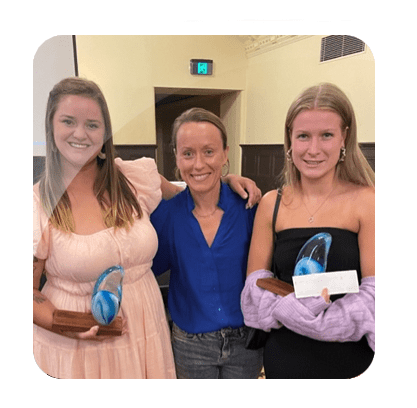
GRIFFITH UNIVERSITY – VOICELESS ANIMAL LAW PRIZE 2023
Voiceless is proud to continue sponsoring Griffith Law School’s annual Voiceless Animal Law Prize. Griffith University teaches the next generation of animal changemakers about using the law to protect animals, and we are proud to congratulate the 2023 award recipient, Amiel Morris, on her outstanding achievement. Amiel spoke to us about her interest in animal law and her plans for the future below.
Voiceless: What inspired you to study animal law?
Amiel: When I was a kid, I loved animals. I was obsessed with wildlife shows, I was a part of environmental club at primary school, was environmental captain in year 7, and helped my year 7 class raise money for endangered animals (specifically, as a class we loved orangutangs and other animals from Borneo). I would even have my parents read me animal fact books instead of story books at bedtime.
When I saw Animal Law as an elective option at Griffith, I was inspired to take it by my younger self who always wanted to work with and protect animals. This course opened my eyes to the insane reality of animal welfare law in Australia and the world. It’s something I would never have learnt about without taking the course, and I am so grateful that I did and that I now have this knowledge.
I also have friends who are studying veterinary medicine and marine and conservation biology, and this course has allowed me to have open conversations with my friends about animal welfare and animal rights from varying perspectives. We can challenge our ideas and introduce concepts of animal welfare to our wider friend group. Our conversations continue to inspire me and allow me to continue thinking about animal law.
Voiceless: What are your plans for the future?
Amiel: My plans for the future involve further study in law and government and international relations. I adore research and writing, and I am currently in the process of writing my Honours Thesis on social media feminism and law reform in Australia and the United States. I plan to continue my studies somewhere in the feminist law space. Animal law and protection will always have a special place in my heart, and I will continue talking to my community about animal law in Australia and around the world.
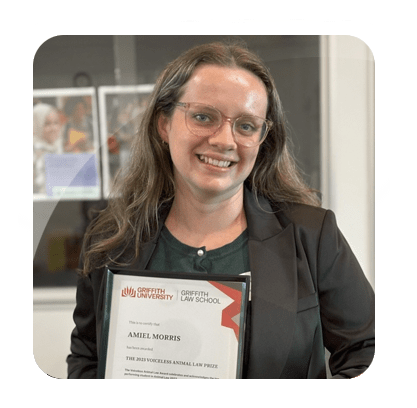
ANIMAL JUSTICE AWARDS – 2023
Every year the Animal Justice Foundation (AJF) provides awards and one-off financial grants to support outstanding animal charities, thought-leading activists, and innovative community organisations who are progressing animal justice. In 2023, Voiceless partnered with the AJF in two categories and the following prize winners were announced:
The Voiceless Award for Sanctuary Education was awarded to Edgar’s Mission for its educational strategies to raise awareness and promote critical thinking about animal protection issues. The Voiceless Award for Youth Advocacy was awarded to Emma Hakansson, Founder of Collective Fashion Justice for her demonstrated passion and commitment to the Australian animal protection movement in the past few years.
Both winners received a bespoke award and $2,500 from Voiceless in recognition of their work.
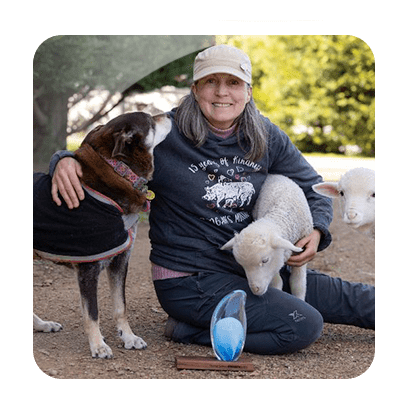

GRIFFITH UNIVERSITY – VOICELESS ANIMAL LAW PRIZE 2022
Voiceless is proud to continue sponsoring Griffith Law School’s annual Voiceless Animal Law Prize. Griffith University teaches the next generation of animal changemakers about using the law to protect animals, and we were proud to congratulate the 2022 award recipient, Ella Leitch, on her outstanding achievement. Ella spoke to us about her interest in animal law and her plans for the future below.
Voiceless: What inspired you to study animal law?
Ella: I have fostered a lifelong passion for animal rights, and, throughout my academic journey, I seized every chance to delve into the subject matter. Recently, I had the privilege of enrolling in the Animal Law elective at Griffith University which proved to be an excellent course. Not only did it provide valuable insights into the legislative landscape of animal rights in Queensland, but it also allowed me to conduct my own research and propose reforms aimed at bolstering animal protection.
Voiceless: What are your plans for the future?
Ella: Should I be fortunate enough to work in Animal law, I hope to contribute to the profession of those dedicated to improving the legal status of animals and the safeguards that this status enables.
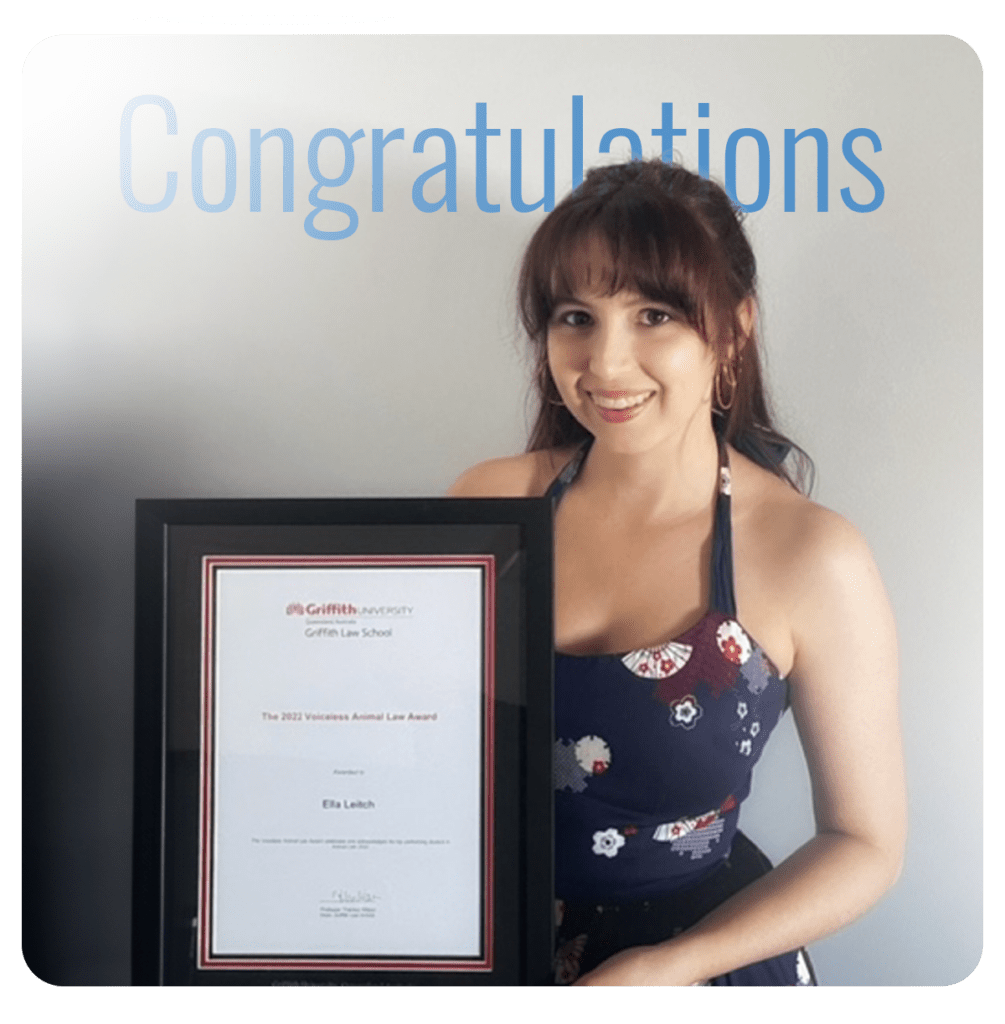
GRIFFITH UNIVERSITY – VOICELESS ANIMAL LAW PRIZE 2021
We congratulate the 2021 award recipient, Renae Sherwood.
Voiceless was proud to sponsor the Griffith Law School’s 2021 Animal Law Prize. Griffith University teaches the next generation of changemakers about the law relating to animals, emphasising the relationship between law and the ethics of animal protection. We congratulate this year’s award recipient, Renae Sherwood, on her outstanding achievement.
VOICELESS BRIAN SHERMAN ANIMAL LAW PRIZE ($2,500)
The Voiceless Brian Sherman Animal Law Prize is one of the many ways we are honouring the memory and legacy of Voiceless Co-Founder, the late Brian Sherman AM (1943-2022) and his lifetime dedication to animal law and protection. The prize recognises the work of innovative legal advocates committed to the growth of animal law in Australia and reforming the law to promote animal rights. Reflecting the spirit of Brian, recipients must demonstrate innovative entrepreneurial spirit and out-of-the-box thinking in animal law.
We congratulate the 2022 award recipients, Mike Rosalky and Naaman Kranz.
Mike and Naaman established Australia’s very first generalist private animal law firm in 2018 – K & R Animal Law – and are dedicated to using the law creatively to promote animal rights and protect animals from unjust treatment. Through K & R, Mike and Naaman have helped a range of Australian animal protection organisations and advocates. They are committed to reforming the injustices that exist within our current legal structure by exploring exciting strategic litigation options to improve the lives of animals.
Please note that prize recipients were selected unanimously by the prize creators – Voiceless (Ondine Sherman, Kate Grigg), Dr Meg Good and Dr Sophie Riley. All decisions are final. Voiceless Board members, former/current Voiceless staff and recipients of any animal law prizes/scholarships (whether from Voiceless or any other source) conferred in the past two years are not eligible.
